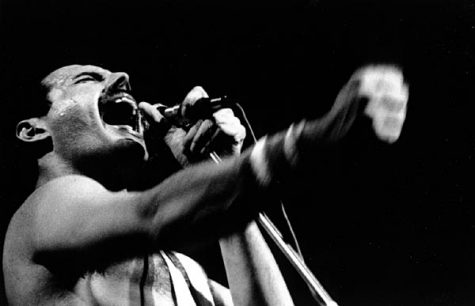Remembering an icon throughout time
November 16, 2018
Regarded as the best vocalist of all time, paved the way for other artists, created the first modern music video, had a four-octave vocal range and known as one of the best live performers of all time: Freddie Mercury. You know, that one guy from that band your dad likes.
The lead singer of rock band Queen has been thrown into the public eye again thanks to the new biopic film, Bohemian Rhapsody. But did he ever leave the public eye? Saturday, November 24 will mark the 27th anniversary of Mercury’s death. “I won’t be a rockstar. I will be a legend,” Mercury said. Mercury deserves to be remembered as an icon and the front man that changed music forever.
Freddie, born in Zanzibar, Africa, attended school at St. Peter’s Boys’ School in Indiana. He moved to London in 1971, where he met guitarist Brian May, drummer Roger Taylor and bassist John Deacon. Thus the band was formed. Their first two albums “Queen” and “Queen 11” were praised by critics but did poorly commercially. In 1974, Queen finally broke out from the shadows with their next album “Sheer Heart Attack”. With more radio-friendly songs, Queen’s third album found them an audience and gave them commercial success. Major success was given to the band in 1975 with their fourth and most successful album “A Night at the Opera”, with help of the now classic song “Bohemian Rhapsody”. This album sold more than a million copies within the year. The short promotional film that accompanied the six-minute rock ballad is credited as the first modern music video.

From 1976 to 1986 Queen released eight more albums. But nothing could compare to Mercury’s on-stage presence. Known for his unconventional costumes and interaction with the fans, nobody could keep a crowd the way he did. “Of all the theatrical performers, Freddie took it further than the rest. He took it over the edge. And of course, I always admire a man who wears tights,” David Bowie said.
Mercury gave his last live performance with Queen on August 9, 1986. “I always knew I was a star and now, the rest of the world seems to agree with me,’” Mercury said. In 1988, Mercury had started to grow thin and rumors of the operatic rock singer’s health had been plastered all over news sources. Over the next three years, the group continued to compose new music, releasing two new albums. In this time, Freddie’s health was declining at an alarming rate.
Queen continued to deny rumors and kept making music. “He just kept saying. ‘Write me more. Write me stuff. I want to just sing this and do it and when I am gone you can finish it off.’ He had no fear, really,” Brian May said about Freddie’s dedication to making music.
Mercury announced that he had AIDs on November 23, 1991. He passed away November 24, 1991. Queen’s iconic mixture of hard rock, opera, heavy metal and glam rock has earned them a place in the Rock and Roll Hall of Fame and in history.
Freddie deserves nothing less than to be remembered as a legend. Remember Freddie and his story. Carry on his legend and who he was. His memory is still alive and well. Freddie Mercury’s two-decade rule over rock music has transcended beyond his passing and into the present with fans all over the world chanting his music and name.



